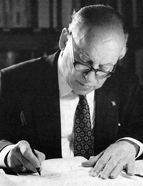

He was not granted a position as a university assistant, later explaining why: “because at the time I was too rebellious for the conservatism of Coimbra to like me” (Correspondence with Marcelo Caetano, p. 458). He returned to his homeland, summarising his early post-graduate years as follows: “From October 1948 to November 1950, I stayed in Santarém teaching history, literature and philosophy at private schools and spent my free time writing frequently for the weekly newspaper Correio do Ribatejo and the periodical Vida Ribatejana. This gave him the opportunity to make his debut in regional journalism, which he never abandoned, later writing for national newspapers: in the daily O Dia, with some regularity, and occasionally in Diário de Notícias. In this daily newspaper, in O Jornal, Expresso and Público, he engaged in several controversies, a characteristic trait of his personality, but also an expression of his commitment as a citizen.
He was not satisfied with the level of teaching to which he was then devoted. He dreamed of flying higher. He considered pursuing a diplomatic career, to which his degree gave him access at the time, although without much enthusiasm, and he did not have the personal fortune that was then considered indispensable, so he gave up on this idea, following his father’s advice. However, the opportunity he had cherished as his life’s project arose: a university teaching position. A vacancy for a lecturer in Portuguese culture had opened up at the University of Toulouse, and he was appointed to the post by the Institute of Higher Culture (1950-1960).
In the Portuguese Studies department at the University of Toulouse, he met a group of renowned French historians, some of whom were very interested in Portuguese culture, while others were dedicated t y fields of knowledge, from whom Joaquim Veríssimo Serrão began to take lessons: human geography with Daniel Faucher; southern legal history with Paul Ourliac; institutions before and after the French Revolution with Jacques Godechot; ethics as a philosophical discipline with Georges Bastide; Hispanic geography in its relationship with Portugal with Jean Sermet; and Atlantic history with Fréderic Mauro, with whom he formed a lasting friendship. But among all his great teachers, it was Léon Bourdon, director of the Department of Portuguese Studies during his first three years in Toulouse – who would later become professor of Portuguese Studies at the Sorbonne – who left the deepest mark on him with the rigour he instilled in him regarding documentary research and the methodology to be followed in scientific work.
This work is financed by national funds through FCT - Foundation for Science and Technology, I.P, in the scope of the projects UIDB/04311/2020 and UIDP/04311/2020.
